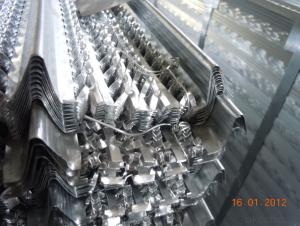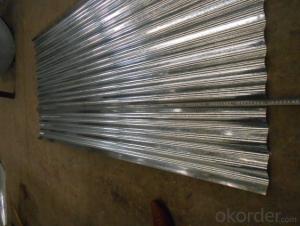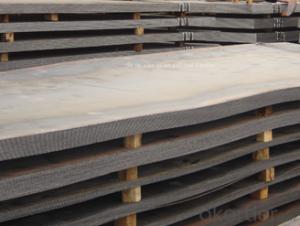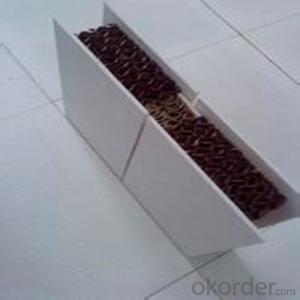GAVANIZED RIB MESH
- Loading Port:
- China Main Port
- Payment Terms:
- TT OR LC
- Min Order Qty:
- -
- Supply Capability:
- -
OKorder Service Pledge
OKorder Financial Service
You Might Also Like
GAVANIZED Rib Lath is widely used as plaster backing on ceilings, walls and stud partitions. Rib Lath is also ideal for refurbishing damaged or aged masonry walls when a key for rendering is not certain due to disintegration or softening of the wall face.
1.Material:Hot-dipped galvanized sheet
2.Application:
1).Construction formwork mesh has very good engineering quality and construction security;
2).Construction formwork mesh as the concrete permanent assembly
free sheet is much convenient for engineering design and processing;
3).Construction formwork mesh is widely used in tunnels,bridges and valve system and so on
to make the process of construction much more fast and stable.
ZINC COATING: G30 WEIGHT: 4.5KG/SHEET
- Q:How are steel sheets protected from damage during handling and transportation?
- Steel sheets are protected from damage during handling and transportation through various methods. One commonly used method is the application of a protective coating on the surface of the steel sheets. This coating can be in the form of a special paint or a layer of zinc, known as galvanization. The protective coating acts as a barrier, preventing any moisture or corrosive elements from reaching the steel sheets and causing damage. In addition to the protective coating, steel sheets are often stacked and secured properly to ensure their stability during transportation. They are usually placed on wooden pallets or in specially designed crates to prevent any direct contact with the ground or other surfaces. This helps minimize the risk of scratches, dents, or other physical damage that may occur during handling or transportation. Furthermore, steel sheets are often packaged and wrapped with materials such as plastic or stretch film to provide an extra layer of protection. This packaging helps safeguard the sheets from dust, dirt, and other contaminants that may affect their quality or appearance. Moreover, steel sheets may be equipped with edge protectors made of plastic or cardboard. These edge protectors prevent any impact or compression damage to the edges of the sheets, which are particularly susceptible to deformation. Finally, proper handling and lifting techniques are essential in safeguarding steel sheets during transportation. Employing specialized equipment such as forklifts or cranes with suitable clamps or magnets ensures that the sheets are lifted and moved without causing any bending or warping. Overall, a combination of protective coatings, proper packaging, and careful handling techniques are employed to safeguard steel sheets from damage during handling and transportation, ensuring their quality and integrity upon arrival at their destination.
- Q:What are the different types of coatings available for steel sheets?
- There are several types of coatings available for steel sheets, including galvanized coatings, zinc coatings, tin coatings, aluminum coatings, and polymer coatings. Each type of coating offers unique properties and benefits, such as corrosion resistance, improved durability, enhanced aesthetics, and increased protection against environmental factors. The choice of coating depends on the specific application and desired characteristics of the steel sheets.
- Q:Can steel sheets be used for manufacturing medical devices?
- Yes, steel sheets can be used for manufacturing medical devices. Steel is often chosen for its durability, strength, and resistance to corrosion, making it suitable for various medical applications such as surgical instruments, implants, and equipment components.
- Q:What is the typical flexural strength of a steel sheet?
- The typical flexural strength of a steel sheet can vary depending on its grade and thickness. However, most commonly used steel sheets have a flexural strength ranging from 250 to 500 megapascals (MPa).
- Q:Are steel sheets suitable for HVAC systems?
- Yes, steel sheets are suitable for HVAC systems. Steel sheets are commonly used in HVAC systems due to their high strength, durability, and resistance to corrosion. They can be fabricated into various shapes and sizes to meet the specific requirements of HVAC components, such as ductwork, air handlers, and heat exchangers. Additionally, steel sheets can effectively withstand the high temperatures and pressures often encountered in HVAC applications.
- Q:What is the difference between hot rolled and cold rolled steel sheets?
- The main difference between hot rolled and cold rolled steel sheets lies in the production process. Hot rolled steel sheets are manufactured at high temperatures, which results in a rougher surface and less precise dimensions. In contrast, cold rolled steel sheets are processed at lower temperatures and undergo additional rolling, resulting in a smoother surface finish and more accurate dimensions.
- Q:What is the average cost of steel sheets compared to fiberglass?
- The average cost of steel sheets is generally higher compared to fiberglass sheets.
- Q:What is the process of stamping designs on steel sheets?
- The process of stamping designs on steel sheets involves using a custom-made die or mold that is pressed onto the steel surface with high force. This causes the design to be permanently imprinted onto the steel sheet.
- Q:Are the steel sheets easy to maintain?
- Yes, steel sheets are easy to maintain. They require minimal upkeep, are resistant to corrosion, and can be easily cleaned with common household products.
- Q:What are the different types of steel sheet finishes for automotive applications?
- The different types of steel sheet finishes for automotive applications include hot-dipped galvanized, electrogalvanized, galvannealed, and bare steel.
1. Manufacturer Overview |
|
|---|---|
| Location | |
| Year Established | |
| Annual Output Value | |
| Main Markets | |
| Company Certifications | |
2. Manufacturer Certificates |
|
|---|---|
| a) Certification Name | |
| Range | |
| Reference | |
| Validity Period | |
3. Manufacturer Capability |
|
|---|---|
| a)Trade Capacity | |
| Nearest Port | |
| Export Percentage | |
| No.of Employees in Trade Department | |
| Language Spoken: | |
| b)Factory Information | |
| Factory Size: | |
| No. of Production Lines | |
| Contract Manufacturing | |
| Product Price Range | |
Send your message to us
GAVANIZED RIB MESH
- Loading Port:
- China Main Port
- Payment Terms:
- TT OR LC
- Min Order Qty:
- -
- Supply Capability:
- -
OKorder Service Pledge
OKorder Financial Service
Similar products
New products
Hot products
Related keywords





























